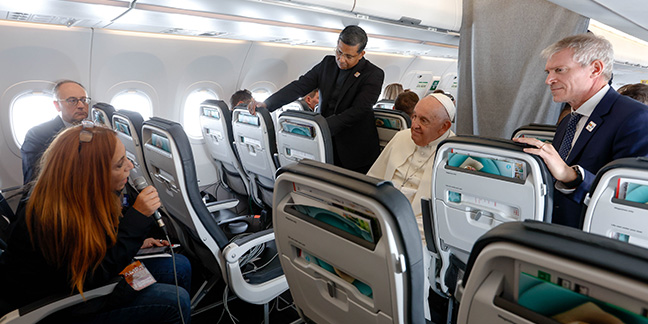 ABOARD THE PAPAL FLIGHT FROM BELGIUM — Using disproportionate force after being attacked is immoral, Pope Francis said.
ABOARD THE PAPAL FLIGHT FROM BELGIUM — Using disproportionate force after being attacked is immoral, Pope Francis said.
There are rules, even in war, that should be followed, he said. And when those rules are not adhered to you can see, "as we say in Argentina, the 'bad blood'" or bad intentions behind the actions.
During a brief question-and-answer period with reporters on the papal plane returning to Rome from Belgium Sept. 29, the pope was asked specifically whether he thought Israel had gone too far in its most recent strike on Lebanon.
The U.S. reporter had prefaced the question by saying Israel, in its targeted strike assassinating Hezbollah leader, Hassan Nasrallah, had dropped tons of explosives on Lebanon, resulting in many casualties and displacing hundreds of people, which prompted the pope to put his hand to his face in a show of despair.
"Has Israel perhaps gone too far in Lebanon and Gaza?" the reporter asked.
The pope replied that he speaks every day by phone with the people who have been sheltering in Gaza's Catholic church, "and they tell me about the things that are happening, even the cruelty that happens there."
He said he was not sure about what really happened in Lebanon, but he said a nation's "defense must always be proportionate to the attack."
"When there is something disproportionate, one shows a tendency to dominate which goes beyond what is moral," he said.
Defensive actions that are so "excessive," he said, "are immoral actions."
After Mass at the stadium, the pope had appealed to all parties involved in conflicts in the Middle East "to cease fire immediately in Lebanon, in Gaza, in the rest of Palestine, and in Israel."
"Hostages must be released, and humanitarian aid must be allowed," he said, adding he feels sorrow and great concern hearing about "the escalation and intensification of the conflict in Lebanon."
Another reporter asked about his recent praise of the late King Baudouin of Belgium, whom the pope had said, when he prayed at his tomb Sept. 27, was courageous to abdicate his throne for a day so he did not have to give his assent to a bill Parliament passed in 1990 legalizing abortion.
The pope had also said after Mass Sept. 29 that he wanted Belgium's bishops to commit to advancing the sainthood cause of the leader who died in 1993. He is an example of a man of faith who should "illuminate leaders," the pope said after the Mass.
On the plane, the pope said, "it takes a politician who 'wears pants' to do this, it takes courage."
Replying to a reporter's question about how to balance the rights of women and the right to life, the pope said, "Women have the right to life: to her life and her children's lives."
"Abortion is homicide," he said, and doctors who perform abortions "are hitmen. And there can be no debate about this."
"Contraceptive methods are something else. Don't mix them up. I am talking about abortion," he said.
Asked about what he will do with the requests for action he received from victims of clergy abuse he met with in Brussels Sept. 27, the pope said the church has "a responsibility to help those abused and to take care of them" and to punish the perpetrators.
Perpetrators cannot be left "free to live a normal life with responsibilities in the parish or schools," he said. They suffer from a psychiatric illness, not "a sin" that one can choose not to commit. — Carol Glatz, Catholic News Service


